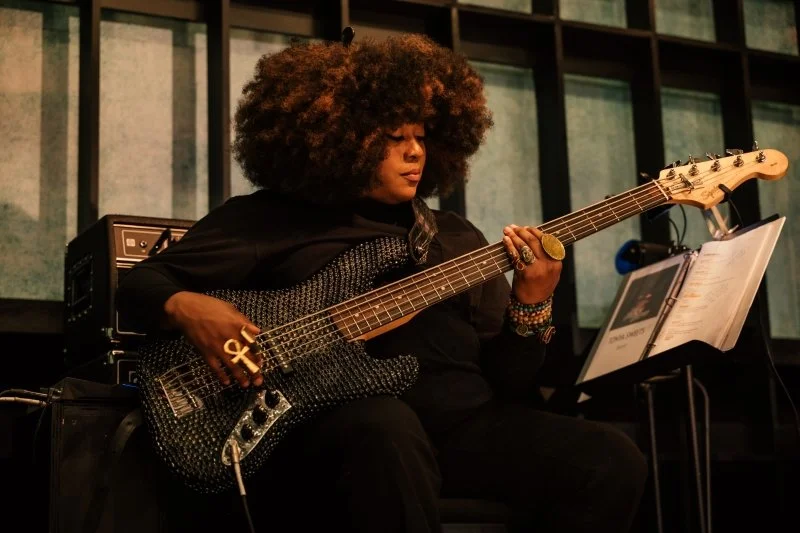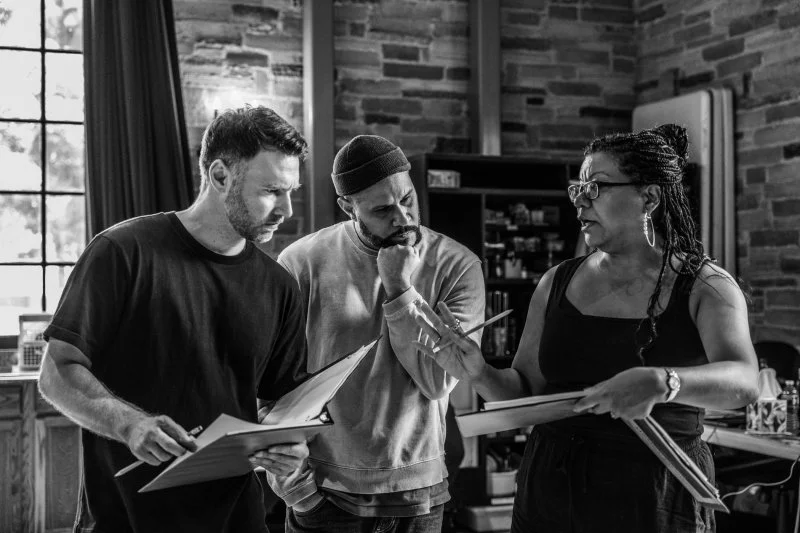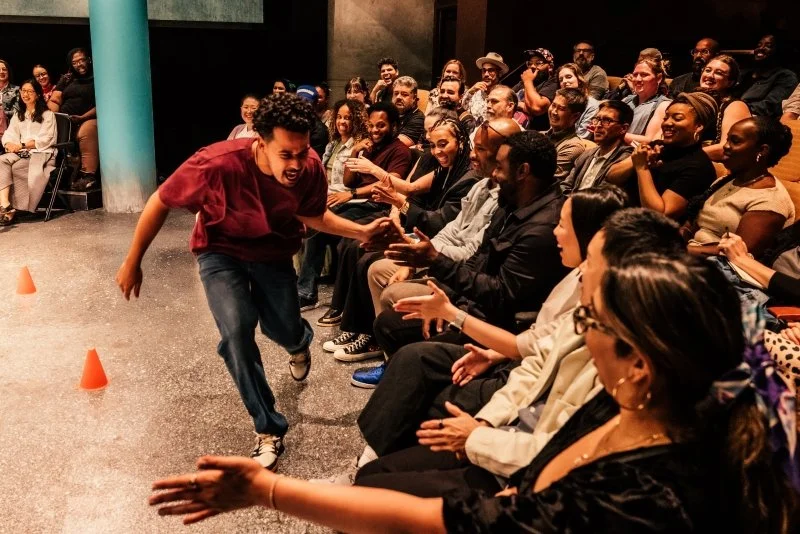‘littleboy/littleman’: Between Daydreams and Obligations
It’s not every day that actors hurl the words “comepinga” or “tira flechas”¹ at each other on stage. Through language and a tender, sometimes tense, plot, playwright and performer Rudi Goblen transports an audience from an intimate theater at the Geffen Playhouse in Los Angeles to South Florida. The result is littleboy/littleman, an undeniably Miami story that treats Nicaraguans as the main characters and not an afterthought.
Nicaraguan stories are rare; it’s one reason Goblen, who was born in Managua, decided to write littleboy/littleman, which Nancy Medina directed. “I did not and could not find Nica characters within the Western theater canon, and that was saddening and frustrating,” he tells Intervenxions.
Taking on this challenge can create undue pressure to get it right, but Goblen leans into what he knows—blending words, performance, music, poetry, and dance—to create a rich portrait of Nicaraguans. The story follows brothers Fito Palomino and Bastian Monteyero as they try to rebuild their lives after the death of their mother. The two are at odds of how to survive, which causes tension between the brothers.
As attendees walk into the Geffen Playhouse’s Audrey Skirball Kenis Theater, which can seat 149, actor Marlon Alexander Vargas, who plays Fito, greets them as though he were inviting them into his home. As he counts down and asks audience members how they feel, musicians Dee Simone (drummer) and Tonya Sweets (bassist) play on an elevated platform behind him instead of being sunken in an orchestra pit. The trio’s energy is infectious, with members of the audience bopping along in their seats, bought in from the very beginning.
Everything is performance, even the standard reminders that audiences should not take photos or record videos during the show. But instead of a chiding voice essentially wagging a finger at the crowd, it’s Vargas, or maybe his character, Fito, asking the audience to refrain from documenting the show with their devices because he was “feeling a little bloated.”
The line between where Vargas ends and Fito begins is unclear, but it’s part of the show’s charm. When it officially kicks off, and there is only Fito, the room becomes dim as he breaks into a poem about being raised by his mother and abuelita. Attendees serve as his audience, but it’s only when his brother, Bastian (played by Alex Hernandez), comes home and interrupts his daydreaming that it’s clear that he is not performing in front of anyone. He’s in his living room envisioning the future. The audience is, therefore, a representation of the success Fito thinks is possible if he pursues a career where triumph is anything but guaranteed.
The scene perfectly encapsulates the dynamic between the two brothers. Fito is a dreamer with impulsive tendencies. Meanwhile, Bastian, the older brother, is a realist. While the two clearly love and need each other, their views on what types of lives they should lead is a point of contention.
It’d be easy to draw the conclusion that because Bastian is older, he has solely shouldered the burden of taking care of them. It later becomes apparent that Fito had to work to support them while Bastian became their sick mother’s caretaker before her death.
Instead, their disparate viewpoints are how they process their trauma. Bastian, who was almost a child soldier in Nicaragua—a reality that remains nebulous but exists in media like Werner Herzog and Denis Reichle’s Ballad of the Little Soldier—chooses to assimilate into a country that helped destabilize the home he had to leave behind. Meanwhile, Fito, who didn’t get a chance to be by his mother’s side as she died, refuses to believe there are limits to his dreams.
As such, the title isn’t a dichotomy; it captures the missed potential when Black and brown men have to grow up too fast.
“The title was birthed from personal familial reasons,” Goblen says. “But it has grown into many different things throughout its development. One of my favorites is how the adultification of Black and brown youth leaves us with adult men who did not have the opportunity or privilege to truly be boys in this world.”
Despite the heaviness of these topics, the play brings lightheartedness to the stage. Sandwiched between moments like the brothers remembering their grandmother’s tragic death to Fito’s brush with a Cuban police officer who disparagingly calls him a “tira flecha,” there are also humorous moments, like when Bastian, who works in telesales, switches from accent to accent to better appeal to the donors on the other end.
The play cycles from a good moment to a bad one, which can feel temporarily disorienting, but that’s precisely how life can be. Particularly in the midst of survival, there’s often little time for those struggling to catch their breath, regroup, and move forward. The audience, however, gets a break. Goblen’s words eventually provide enough context so the viewer can continue to follow the storyline and reorient themselves. For example, in one scene, the brothers stand in a pitch black room as they seemingly have a shared nightmare. As they continue to speak, it becomes clear that they are recounting the break-in that led to their grandmother’s death.
Or toward the end of the production, when Fito walks around asking the audience where they are from and collects donations. Until an audience member puts a bill into the bag he holds open, it’s not obvious if people should reach into their wallets. When the audience does catch up, the actor doubles back because there are some people who didn’t make a donation when he first made his way through the theater.
Miami-Dade County is home to approximately 107,000 Nicaraguans. With about 37% of U.S.-based Nicaraguans living in Florida, the state has the highest concentration of Nicoyas. Littleboy/littleman takes place in Sweetwater, a Miami neighborhood that locals sometimes call Little Managua because of the prevalence of Nicaraguans.
Despite a strong presence in the area, Nicaraguans aren’t immune to prejudices, xenophobia, or colorism. The brothers illustrate this. While Bastian wants to change his last name to sound more American, he doesn’t walk through life in the same way as Fito, who is visibly a person of color and therefore racialized. The cop only calls one of the brothers, Fito, a “tira flechas,” turning a word that Nicaraguans sometimes use in a playful way into a slur.
While the brothers might not think about the racial differences between the two of them, the world around them will not let them forget it. “I [wanted] to talk about colorism within the Latinx community, which is something you have to be engaged with and will be activated by in a place like Miami,” Goblen says. The playwright drew from his own experiences as a “multiracial body in the industry,” and one of his goals was to show “how nuanced, how complex and how rich a body like mine is.”
Goblen wrote an ambitious piece of art that touches on grief, trauma, colorism, and assimilation while still ending on a hopeful note. He centered Black and brown artists and spotlighted a community that has, to date, received little recognition. In many ways, that can seem like a risk. Instead, it’s indicative of what can happen when artists have the ability to dream and create as they wish.
¹ Tira flechas can be a neutral term among Nicaraguans. However, it can also be a slur. For example, in 2013, an aide for then mayoral candidate Francis Suarez used the term on social media. Suarez received backlash for not firing her earlier. In littleboy/littleman, the term is only used in negative ways.








